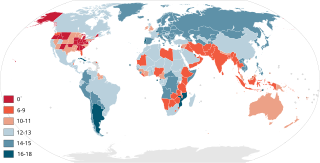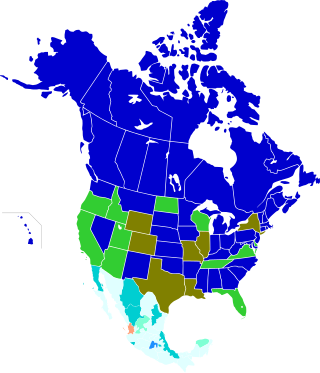Related Research Articles
Life imprisonment is any sentence of imprisonment for a crime under which convicted criminals are to remain in prison for the rest of their natural lives. Crimes that warrant life imprisonment are extremely serious and usually violent. Examples of these crimes are murder, torture, terrorism, child abuse resulting in death, rape, espionage, treason, Illegal drug trade, human trafficking, severe fraud and financial crimes, aggravated Property damage, arson, hate crime, kidnapping, burglary, and robbery, piracy, aircraft hijacking, and genocide.

The age of criminal responsibility is the age below which a child is deemed incapable of having committed a criminal offence. In legal terms, it is referred to as a defence/defense of infancy, which is a form of defense known as an excuse so that defendants falling within the definition of an "infant" are excluded from criminal liability for their actions, if at the relevant time, they had not reached an age of criminal responsibility. After reaching the initial age, there may be levels of responsibility dictated by age and the type of offense committed.

The Hudud Ordinances are laws in Pakistan enacted in 1979 as part of the Islamization of Pakistan by Muhammad Zia-ul-Haq, the sixth president of Pakistan. It replaced parts of the British-era Pakistan Penal Code, adding new criminal offences of adultery and fornication, and new punishments of whipping, amputation, and stoning to death. After much controversy and criticism parts of the law were extensively revised in 2006 by the Women's Protection Bill.

The Indian Penal Code (IPC) was the official criminal code in the Republic of India, inherited from British India after independence, until it was replaced by Bharatiya Nyaya Sanhita in December 2023. It was a comprehensive code intended to cover all substantive aspects of criminal law. The code was drafted on the recommendations of the first Law Commission of India established in 1834 under the Charter Act of 1833 under the chairmanship of Lord Thomas Babington Macaulay. It came into force on the subcontinent during the British rule in 1862. However, it did not apply automatically in the Princely states, which had their own courts and legal systems until the 1940s. The code has since been amended several times and is now supplemented by other criminal provisions.
The Pakistan Penal Code, abbreviated as PPC, is a penal code for all offences charged in Pakistan. It was originally prepared by Lord Macaulay with a great consultation in 1860 on behalf of the Government of British India as the Indian Penal Code. After the creation of Pakistan in 1947, Pakistan inherited the same code and subsequently after several amendments by different governments, in Pakistan it is now a mixture of Islamic and English Law. Presently, the Pakistan Penal Code is still in effect and can be amended by the Parliament of Pakistan.

The Juvenile Justice Act, 2000 is the primary legal framework for juvenile justice in India. The act provides for a special approach towards the prevention and treatment of juvenile delinquency and provides a framework for the protection, treatment and rehabilitation of children in the purview of the juvenile justice system. This law, brought in compliance of the 1989 UN Convention on the Rights of the Child (UNCRC), repealed the earlier Juvenile Justice Act of 1986 after India signed and ratified the UNCRC in 1992. In the wake of Delhi gang rape, the law suffered a nationwide criticism owing to its helplessness against crimes where juveniles get involved in heinous crimes like rape and murder. In 2015, responding to the public sentiment, both the houses of parliament in India further amended the bill that proposed adult-like treatment for juveniles aged 16–18 above accused of heinous crimes. The lower house, i.e. Lok Sabha passed the bill on 7 May 2015 and the upper house, i.e. Rajya Sabha on 22 December 2015. The bill was approved by President Pranab Mukherjee's assent on 31 December 2015.

The judiciary of Pakistan is the national system of courts that maintains the law and order in the Islamic Republic of Pakistan. Pakistan uses a common law system, which was introduced during the colonial era, influenced by local medieval judicial systems based on religious and cultural practices. The Constitution of Pakistan lays down the fundamentals and working of the Pakistani judiciary.
The legal age of consent for sexual activity varies by jurisdiction across Asia. The specific activity engaged in or the gender of participants can also be relevant factors. Below is a discussion of the various laws dealing with this subject. The highlighted age refers to an age at or above which an individual can engage in unfettered sexual relations with another who is also at or above that age. Other variables, such as homosexual relations or close in age exceptions, may exist, and are noted when relevant.
The ages of consent vary by jurisdiction across Europe. The ages of consent – hereby meaning the age from which one is deemed able to consent to having sex with anyone else of consenting age or above – are between 14 and 18. The vast majority of countries set their ages in the range of 14 to 16; only four countries, Cyprus (17), Ireland (17), Turkey (18), and the Vatican City (18), set an age of consent higher than 16.

In North America, the legal age of consent relating to sexual activity varies by jurisdiction.
Capital punishment is a legal penalty in Pakistan. Although there have been numerous amendments to the Constitution, there is yet to be a provision prohibiting the death penalty as a punitive remedy.
In common law jurisdictions, statutory rape is nonforcible sexual activity in which one of the individuals is below the age of consent. Although it usually refers to adults engaging in sexual contact with minors under the age of consent, it is a generic term, and very few jurisdictions use the actual term statutory rape in the language of statutes. In statutory rape, overt force or threat is usually not present. Statutory rape laws presume coercion because a minor or mentally disabled adult is legally incapable of giving consent to the act.

The Punjab Prisons is a correctional organization, a uniformed service and an attached department of the provincial Home Department in Punjab, Pakistan. The organization works under administrative control of the Additional Chief Secretary Home to Government of the Punjab, Pakistan. Functional head of the organization is Inspector General of Prisons who manages 69 prisons in the province. The organization is responsible for custody, control, care and correction of prisoners confined in various central, district and special jails in the province of Punjab, Pakistan).
Child labour in Pakistan is the employment of children to work in Pakistan, which causes them mental, physical, moral and social harm. Child labour takes away the education from children. The Human Rights Commission of Pakistan estimated that in the 1990s, 11 million children were working in the country, half of whom were under age ten. In 1996, the median age for a child entering the work force was seven, down from eight in 1994. It was estimated that one quarter of the country's work force was made up of children. Child labor stands out as a significant issue in Pakistan, primarily driven by poverty. The prevalence of poverty in the country has compelled children to engage in labor, as it has become necessary for their families to meet their desired household income level, enabling them to afford basic necessities like butter and bread.
Child sexual abuse laws in India have been enacted as part of the child protection policies of India. The Parliament of India passed the 'Protection of Children Against Sexual Offences Bill (POCSO), 2011' regarding child sexual abuse on 22 May 2012, making it an Act. A guideline was passed by the Ministry of Women and Child Development, India. The rules formulated by the government in accordance with the law had also been notified on the November 2012 and the law had become ready for implementation. There have been many calls for more stringent laws.
The Society for the Protection of the Rights of the Child (SPARC) is a Pakistani independent non-governmental organization dedicated to protecting the rights of children.
The concept of probation was introduced to Pakistan, then part of British India, in 1923. This initial system amounted to binding over some first-time offenders, without supervision by probation staff, and applied chiefly to young offenders. Reforms and extension to adult offenders were considered but not implemented under British rule, although a form of "probational release" or parole from longer prison sentences was introduced in the then province of Punjab in 1926.
Child marriage is practiced in some parts of Pakistan, with the highest prevalence in the Sindh province. It disproportionately affects the girl child. According to UNICEF report from 2018, around 18% of the girls in Pakistan are married before the age of 18 giving it the lowest rate of child marriage in South Asia after Sri Lanka. Child marriage occurs most often in rural and the primary driving factor is poverty among the low-income households where education is minimal.
Capital punishment in Bangladesh is a legal form of punishment for anyone who is over 16, however in practice it would not apply to people under 18. Crimes that are currently punishable by death in Bangladesh are set out in the Penal Code 1860. These include waging war against the State, abetting mutiny, giving false evidence upon which an innocent person suffers death, murder, assisted suicide of a child, attempted murder of a child, and kidnapping. The Code of Criminal Procedure 1898 provides that a person awarded the death penalty "be hanged by the neck until he is dead." For murder cases, the Appellate Division requires trial courts to weigh aggravating and mitigating factors to determine whether the death penalty is warranted.
The Islamic Republic of Iran signed the UN Convention on the Rights of the Child (CRC) in 1991 and ratified it in 1994. Upon ratification, Iran made the following reservation: "If the text of the Convention is or becomes incompatible with the domestic laws and Islamic standards at any time or in any case, the Government of the Islamic Republic shall not abide by it."
References
- ↑ section 82 Pakistan Penal Code 1860 . Act of a child above seven and under twelve of immature understanding: Nothing is an offence which is done by a child above seven years of age and under twelve, who has not attained sufficient maturity of understanding to judge of the nature and consequences of his conduct on that occasion section 83 Pakistan Penal Code 1860.://www.pakistani.org/pakistan/legislation/1860/actXLVof1860.html
- ↑ SPARC (2012). The State of Pakistan's Children 2011. Islamabad: SPARC. pp. 119–147. ISBN 9789698616274.
- ↑ SPARC. The State of Pakistan's Children 2011, op. cit.
- ↑ Jillani, Anees (1999). Cries Unheard: Juvenile Justice in Pakistan. Islamabad Pakistan: DFID & SPARC. pp. 62–63.
- ↑ Jillani, Anees (2001). The Juvenile Justice System Ordinance 2000. Islamabad Pakistan: SPARC. p. 1.
- ↑ SPARC. The State of Pakistan's Children 2011, op. cit. pp. 119–147.
- ↑ Rizvi, Tracey Wagner. Juvenile Justice. Islamabad Pakistan: SPARC.